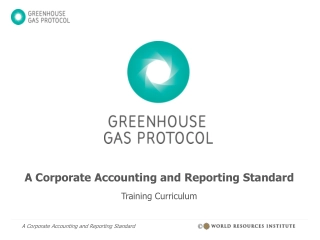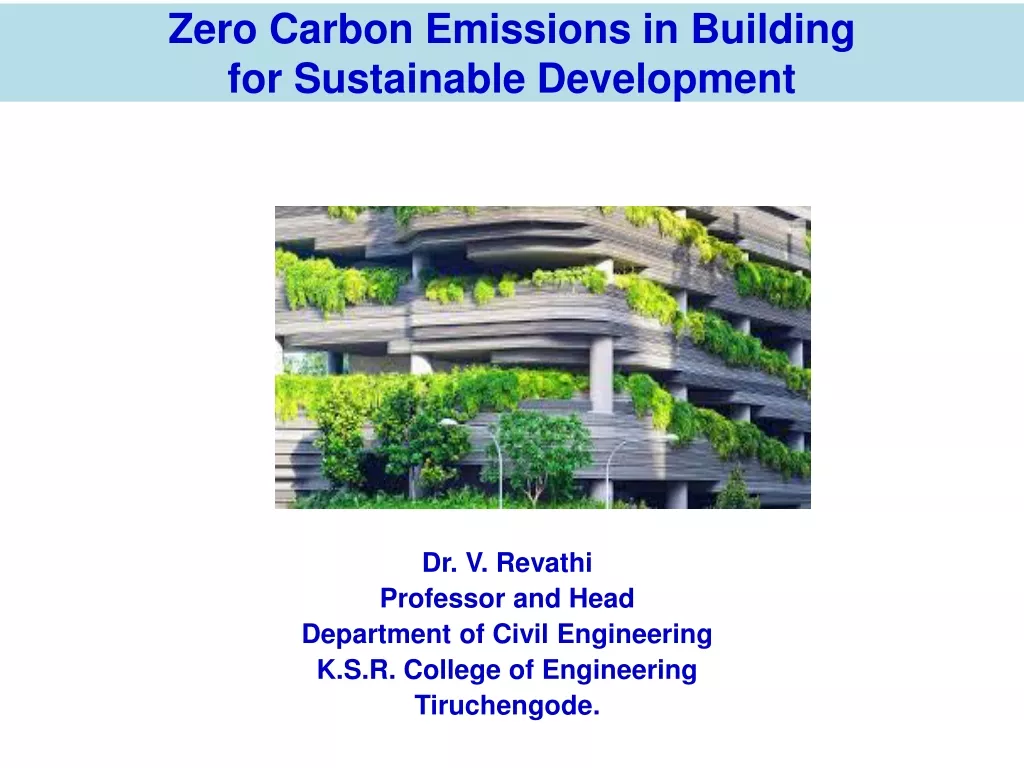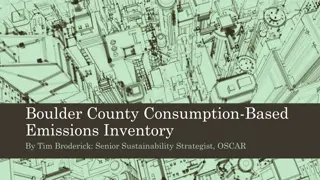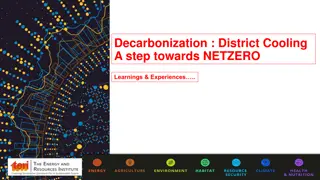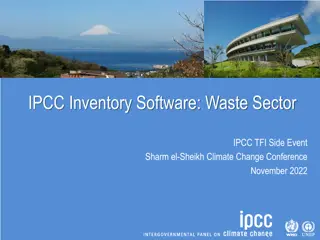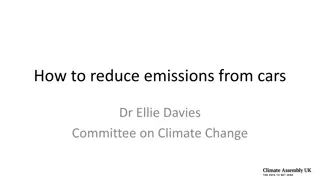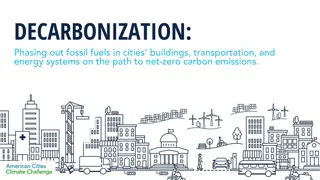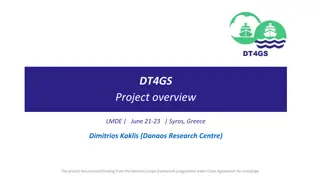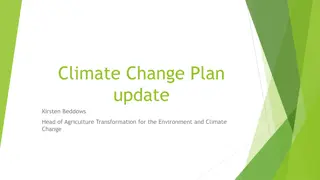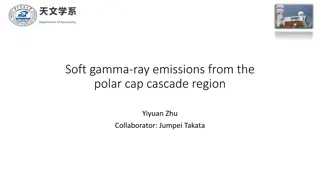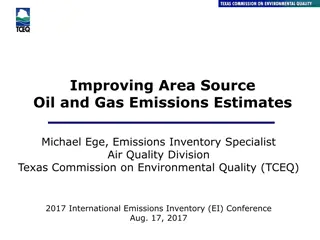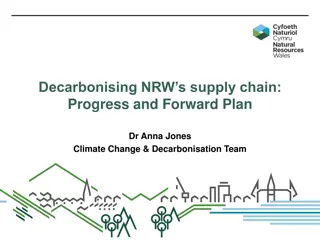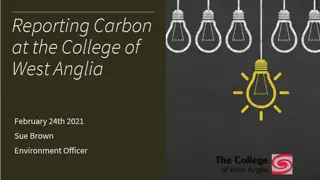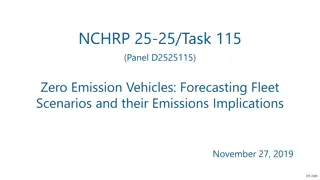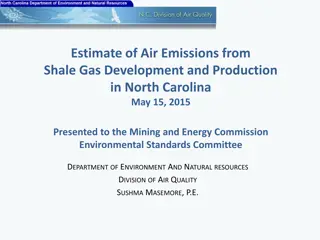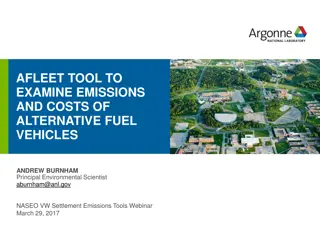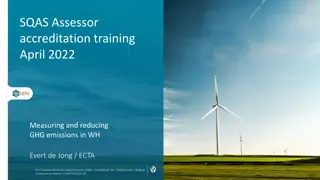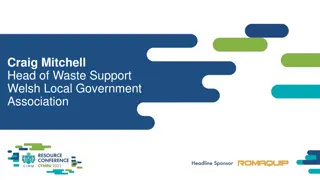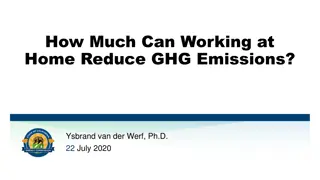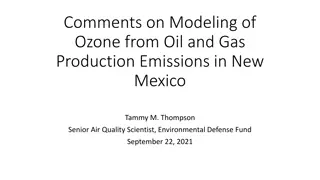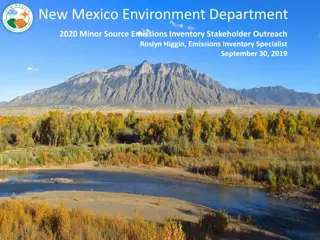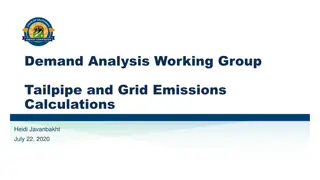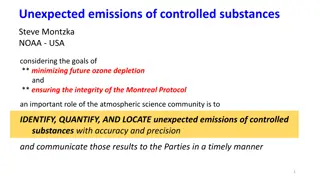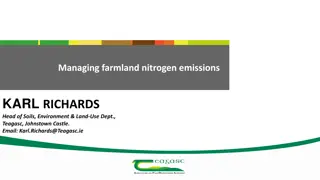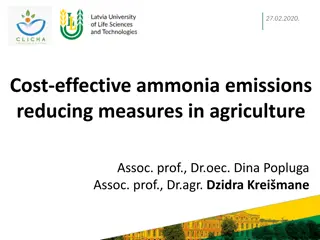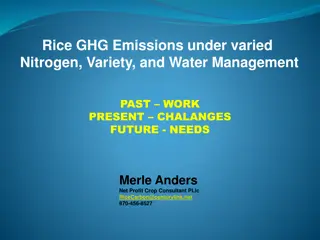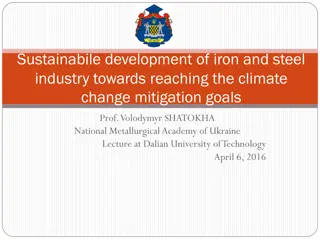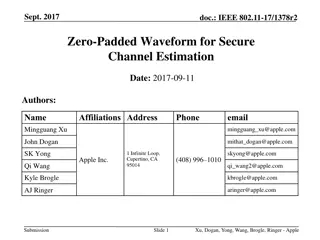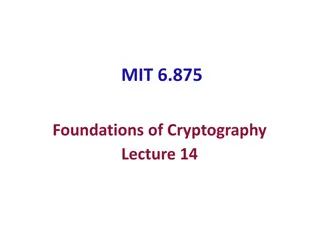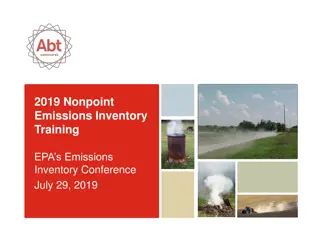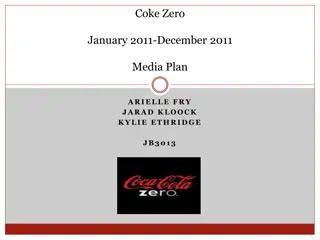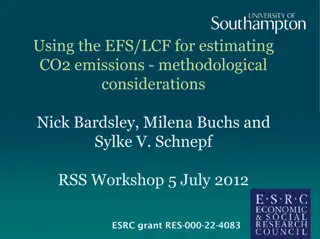A Corporate Accounting And Reporting Standard
Principles and guidelines for preparing GHG emissions inventories, focusing on organizational boundaries, operational boundaries, tracking emissions over time, calculating emissions, and reporting GHG emissions. It emphasizes relevance, completeness, consistency, transparency, and accuracy in accoun
1 views • 14 slides
A Corporate Accounting and Reporting Standard
This training curriculum covers principles of GHG accounting, organizational boundaries, setting operational boundaries, tracking emissions over time, calculating emissions, and reporting GHG emissions. It emphasizes the importance of determining which company operations and emissions sources to inc
3 views • 25 slides
Sustainable Development and Zero Carbon Emissions in Buildings
Sustainable development aims to meet present needs without compromising future generations. Zero carbon emissions in buildings play a crucial role in combating climate change. This article explores the pillars of sustainability, greenhouse gases, global emissions, and steps towards achieving net zer
1 views • 56 slides
Energy Transition and NRE Potential in Indonesia's Path to NZE 2060
Indonesia is focused on transitioning to Net Zero Emissions by 2060, with a significant emphasis on New Renewable Energy (NRE) sources. The country has made strides in increasing NRE utilization, with promising potential in hydro, solar, wind, geothermal, and ocean energy. Additionally, Indonesia is
1 views • 9 slides
Tradeoffs Between Water Savings and GHG Emissions in Irrigated Agriculture
This study examines the tradeoffs between water savings, economic impact, and greenhouse gas emissions resulting from technological changes in the irrigation industry. Key objectives include estimating water savings for different crops, quantifying GHG emissions from new irrigation technologies, and
1 views • 24 slides
The Road to Net Zero: Importance of Data Collection in Energy Management and Consulting
Cotopaxi, a leading energy consultancy, highlights the significance of data collection in achieving net-zero emissions. Mark Jones, a senior energy engineer, emphasizes the long-term impact of climate change and the necessity for businesses to adapt. The journey to net-zero involves measuring, monit
1 views • 15 slides
Climate Action Strategy for Decarbonising Inland Transport by 2050
The Inland Transport Committee (ITC) has adopted a strategy to reduce greenhouse gas emissions from inland transport, aligning with the goal of achieving net-zero emissions by 2050. This strategy includes a focus on reducing GHG emissions, setting strategic objectives, implementing climate actions,
1 views • 19 slides
Consumption-Based Emissions Inventories in Boulder County
Consumption-Based Emissions Inventories (CBEIs) play a crucial role in assessing greenhouse gas emissions linked to local consumption patterns. By calculating emissions associated with products and services used by a community, CBEIs reveal significant gaps in traditional emissions tracking, emphasi
3 views • 13 slides
Decarbonizing Cities' Cooling Systems: A Step Towards Net Zero
District cooling can play a crucial role in decarbonizing cities to achieve net-zero emissions. By focusing on energy-efficient technologies and clean energy sources, cities can significantly reduce carbon emissions from buildings and industries, making a substantial impact on global climate efforts
0 views • 11 slides
IPCC Inventory Software Enhancements for Waste Sector Emissions Estimation
Explore the latest enhancements in the IPCC inventory software related to waste sector emissions estimation. Major updates include subnational disaggregation, Tier 3 methods, wetlands supplement, and improvements in worksheet structure and layout. The software allows for detailed estimation of green
2 views • 10 slides
Strategies to Reduce Emissions from Cars: Expert Insights and Recommendations
Explore ways to reduce emissions from cars, including car technology options, costs comparison, recharging electric vehicles, sales trends of zero-emission vehicles, and the potential impact of ridesharing and driverless cars on emissions reduction efforts.
0 views • 6 slides
Decarbonization and Path to Net-Zero Emissions in Cities
Exploring the journey towards decarbonization and achieving net-zero carbon emissions in cities through initiatives like equitable outcomes, transportation enhancements, renewable energy integration, and sustainable building practices for both new and existing structures. The focus is on going beyon
0 views • 11 slides
Digital Twin for Green Shipping Project Overview
The Digital Twin for Green Shipping (DT4GS) project, funded by the Horizon Europe framework programme, aims to make Digital Twin technology accessible to the shipping industry to facilitate a faster transition to zero emissions. The project focuses on open ship operational optimization, a multi-stak
1 views • 11 slides
Transforming Agriculture for Climate Change: Kirsten Beddows' Vision
Kirsten Beddows, Head of Agriculture Transformation, shares an updated Climate Change Plan focused on reducing emissions, achieving net-zero by 2045, and creating sustainable farming practices. The plan includes over a hundred new policies targeting emissions reduction, land use optimization, and ca
0 views • 9 slides
Soft Gamma-Ray Emissions from Pulsar Polar Caps
Soft gamma-ray emissions from the polar cap cascade region are a subject of interest in astrophysics, with studies focusing on the fundamental physical processes of pulsars and potential origins of non-thermal X-ray emissions. Researchers explore the emission processes, polar cap accelerators, casca
0 views • 16 slides
Emissions Reductions Beyond the Clean Smokestacks Act (CSA) Overview
Emissions Reductions Beyond the Clean Smokestacks Act (CSA) is a comprehensive program aimed at improving air quality by imposing limits on pollutant emissions from coal-burning facilities. The act has successfully achieved significant reductions in nitrogen oxide (NOx) and sulfur dioxide (SO2) emis
2 views • 12 slides
Enhancing Oil and Gas Emissions Estimates for Area Sources
This presentation by Michael Ege, an Emissions Inventory Specialist at the Texas Commission on Environmental Quality (TCEQ), focuses on improving area source oil and gas emissions estimates. It covers the methods used to estimate emissions, including the development of basin-specific equipment profi
0 views • 31 slides
Decarbonising NRW's Supply Chain Emissions: Progress and Challenges
Dr. Anna Jones and her team are spearheading efforts in Wales to achieve net zero emissions by 2050, with a focus on decarbonising NRW's supply chain and the public sector. The Welsh public sector aims to collectively reach net zero by 2030, with a strong emphasis on reporting and reducing emissions
0 views • 10 slides
Corporate Energy Disclosure Requirements and Methodology
Corporations making energy disclosures on a college website by March 31st, 2021, must include annual UK energy use data, greenhouse gas emissions, methodology used, energy efficiency measures, and emissions intensity ratios. The disclosure covers Scope 1, 2, and 3 emissions, business travel, and met
0 views • 23 slides
Zero Emission Vehicles: Forecasting Fleet Scenarios & Emissions Implications
This research project, conducted by Louis Berger U.S. Inc. & Sonoma Technology Inc., explores the implications of adopting zero emission vehicles through forecasting fleet scenarios and estimating emissions reductions. The study assesses the potential increase in zero emission vehicle population, em
0 views • 42 slides
Overview of Air Emissions and Quality Assessment in Shale Gas Development
The presentation discusses the estimation of air emissions from shale gas development and production in North Carolina, highlighting the importance of analyzing emissions from oil and gas activities and associated truck traffic. The process involves building emissions inventory, photochemical modeli
0 views • 22 slides
AFLEET Tool for Examining Emissions and Costs of Alternative Fuel Vehicles
AFLEET is a tool developed by Argonne National Laboratory to analyze the emissions and costs of alternative fuel vehicles. It provides insights into the benefits of using different fuel technologies and helps in decision-making for vehicle fleet management. The tool includes calculations for emissio
0 views • 25 slides
Greenhouse Gas Emissions Management in Warehouse Operations
The SQAS Assessor accreditation training in April 2022 focused on measuring and reducing greenhouse gas emissions in warehouse operations. The content covers emission questions, scope of emissions, energy consumption examples, disaggregation of emissions, emission intensity calculation, and strategi
0 views • 17 slides
Transition & Recovery Support Programme Overview for Local Authorities in Wales
Transition & Recovery Support Programme aims to help Welsh local authorities achieve net zero carbon emissions by 2030 through various initiatives such as governance restructuring, deep dives with the Climate Strategy Panel, and focus on circular economy. The program emphasizes decarbonization strat
0 views • 17 slides
Potential Reduction of GHG Emissions by Working at Home
This analysis explores the impact of increased remote work on reducing greenhouse gas emissions, particularly in the context of the COVID-19 lockdown. By examining workforce data, commuting patterns, and emission statistics in California, the study aims to quantify the potential decrease in GHG emis
0 views • 15 slides
Modeling the Impact of Oil and Gas Emissions on Ozone in New Mexico
Tammy M. Thompson, a Senior Air Quality Scientist at the Environmental Defense Fund, discusses the modeling of ozone from oil and gas production emissions in New Mexico. The analysis focuses on areas with high ozone concentrations and their overlap with oil and gas regions, highlighting the sensitiv
0 views • 8 slides
Emissions Inventory for Air Quality Management
Emissions inventory plays a crucial role in monitoring air pollutant discharges and assessing air quality. This article discusses the purpose of emissions inventory, distinguishing between actual and permitted emissions, and provides guidelines for preparing and reporting minor source emissions inve
0 views • 15 slides
Demand Analysis Working Group: Tailpipe and Grid Emissions Calculations Overview
This report discusses the methodology for calculating tailpipe emissions using vehicle stock and VMT data, along with grid emissions from charging PEVs. Challenges include differences in vehicle classifications and lack of trip forecast calculations. Mapping LDVs from CEC classes to EMFAC classes wa
0 views • 10 slides
Monitoring Unexpected Emissions of Controlled Substances for Ozone Protection
The atmospheric science community plays a crucial role in identifying, quantifying, and communicating unexpected emissions of controlled substances to support the goals of minimizing future ozone depletion and upholding the Montreal Protocol. By comparing observation-based estimates of global emissi
0 views • 13 slides
Managing Farmland Nitrogen Emissions: Strategies and Research Updates
Soils play a crucial role in greenhouse gas emissions and carbon sequestration. Karl Richards, Head of Soils, Environment & Land-Use Department at Teagasc, discusses the importance of managing farmland nitrogen emissions through various practices. Research focuses on reducing emissions and enhancing
0 views • 8 slides
Cost-effective Measures to Reduce Ammonia Emissions in Agriculture
Cost-effective strategies to reduce ammonia emissions in agriculture are crucial in Latvia, where a significant portion of emissions originate from the agricultural sector. The study focuses on potential measures, such as precise mineral fertilizer application, improved manure management, nitrogen f
0 views • 13 slides
Rice GHG Emissions under Varied Nitrogen, Variety, and Water Management Study in Arkansas
Detailed study on rice greenhouse gas emissions under varied nitrogen, variety, and water management treatments, focusing on nitrogen fertility, crop varieties, and water usage impact on methane and nitrous oxide emissions. Research examines optimal nitrogen rates for reduced global warming potentia
1 views • 18 slides
Sustainable Development of Iron and Steel Industry for Climate Change Mitigation
The lecture by Prof. Volodymyr SHATOKHA discusses sustainable development in the iron and steel industry to meet climate change mitigation goals. It examines current global climate targets, the role of the industry in greenhouse gas emissions, and the feasibility of reducing emissions. The study foc
0 views • 27 slides
Zero-Padded Waveform for Secure Channel Estimation in IEEE 802.11-17
Security is a vital aspect in IEEE 802.11az, particularly in secure ranging applications. This document introduces zero-padded waveforms to protect channel estimation against attackers aiming to manipulate the range of STAs. The proposal outlines requirements, including the need to eliminate predict
0 views • 12 slides
Zero-Knowledge Proofs in Cryptography
Exploring zero-knowledge proofs in cryptography, this content delves into interactive protocols, perfect zero-knowledge definitions, and the QR protocol's honest verifier and malicious verifier zero-knowledge theorems. It discusses how simulators work to maintain zero-knowledge properties and the si
0 views • 37 slides
The Nonpoint Emissions Inventory Training Conference
The Nonpoint Emissions Inventory Training Conference held by the EPA provided valuable insights into nonpoint sources of emissions. Sessions covered topics such as NEI definition, previous processes, and developments in the 2017 NEI process. Tools like NEMOs and the Wagon Wheel were introduced to im
0 views • 53 slides
Coke Zero Media Plan 2011: Marketing Strategy & Analysis
Coke Zero, a popular zero-calorie soda by Coca-Cola, targets middle to upper-class consumers aged 21-34 living in metro areas. The media plan for 2011 focuses on enhancing brand awareness and market share among this demographic through strategic media objectives and tactics. With a budget of $35 mil
0 views • 24 slides
Methodological Considerations in Estimating CO2 Emissions Using EFS/LCF
Various studies have utilized the EFS/LCF in the UK to estimate household emissions and policy impacts. This involves converting expenditures into emissions, which presents methodological challenges such as infrequent purchases and variations in data sources. The comparison of household CO2 emission
1 views • 17 slides
Western States Air Quality Study: Emissions Data and Analysis
This study focuses on modeling and analyzing oil & gas emissions data in the Intermountain West region, presented at the Western Air Quality Modeling Workshop. It includes inventories of upstream sectors primarily intended for oil and natural gas production, covering well-site through midstream sour
0 views • 15 slides
Zero Greenhouse Gas Simulation in Regional Agriculture
This study presents a method for simulating zero greenhouse gas emissions in the agricultural sector of Hindmarsh, Yarriambiack, and Horsham rural economies. It explores the impacts of reducing GHGs on regional economies and primary production, utilizing input-output tables and data analysis to exam
0 views • 18 slides

